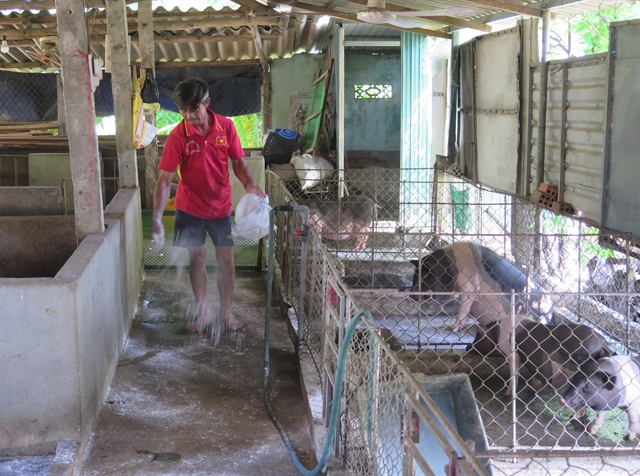 Society
Society


|
| A resident in Quảng Ngãi Province disinfects pig pens following an outbreak of African swine fever. — VNA/VNS Photo |
HÀ NỘI — African swine fever (ASF) is showing signs of resurgence across the country, with widespread underreporting and concealment of outbreaks threatening disease control efforts, according to officials from the Ministry of Agriculture and Environment.
Speaking at a meeting on ASF prevention held in Hà Nội on Tuesday, Phan Quang Minh, Deputy Director of the Department of Livestock Production and Veterinary Medicine, revealed that since the beginning of 2025, 514 outbreaks have been recorded in 27 provinces, affecting over 29,000 pigs. Of these, more than 30,000 pigs have died or been culled.
Currently, 248 outbreaks remain active across 20 provinces, with nearly 20,000 pigs infected.
Compared to the same period in 2024, the number of outbreaks has decreased by 41 per cent, and the number of pigs culled has dropped by more than 60 per cent.
However, Minh warned the disease is showing signs of increasing again, particularly in small-scale, low-biosecurity farms where old outbreaks are re-emerging.
“The risk of continued transmission remains very high,” he said.
Authorities identified six key factors behind the ASF resurgence including widespread small-scale farming without adequate biosecurity, low vaccination uptake despite vaccine availability, concealment of outbreaks by farmers, illegal and unregulated slaughtering practices, weak enforcement of veterinary laws, and limited communication on disease control regulations.
Unofficial reports from local residents, media outlets, and inspection teams have confirmed that disease concealment is rampant in many areas. Infected pigs are often sold off or their remains discarded into the environment, increasing the risk of transmission.
Deputy Minister of Agriculture and Environment Phùng Đức Tiến emphasised the serious threat ASF poses to the national livestock sector, which contributes 25–26 per cent of Vietnam’s total agricultural output.
“If we cannot control the disease, we will lose our growth momentum,” he warned.
He recalled a major outbreak in 2020 that led to the culling of nearly 9 million pigs and drove the country’s consumer price index up by 6.73 per cent, severely impacting both economic growth and investor confidence.
So far, livestock sector has grown 5.4 per cent in the first six months, close to its annual target of 5.7–5.9 per cent. Pork output has risen by 3.8 per cent, while poultry increased by 3.4 per cent. However, ASF and cross-border smuggling remain major threats.
To strengthen ASF prevention and control, officials proposed tightening penalties for hiding outbreaks and trading infected pigs, expanding vaccination coverage, improving biosecurity at farms, and enhancing the capacity of local veterinary authorities, especially at the commune level, where management areas have expanded significantly.
They also called for stricter disease surveillance, early detection and reporting, immediate culling of infected pigs, and stronger controls on the transportation, slaughter, and sale of pigs and pork products. — VNS




